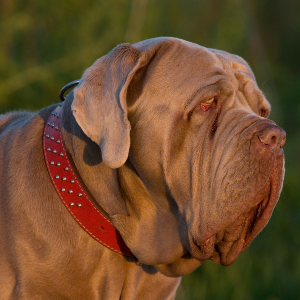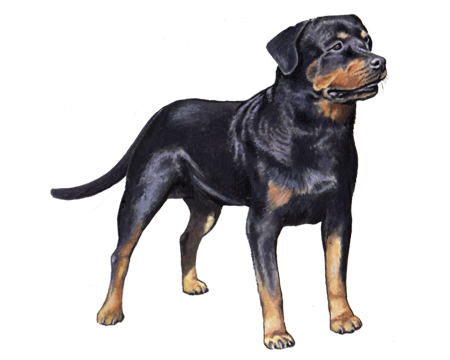
Neapolitan Mastiff
The Neapolitan Mastiff is an intelligent, calm breed that's loving and devoted to its family. These big dogs are good around children and other pets with proper socialization and training. Neapolitan Mastiffs certainly have an imposing size and appearance. But as their owners will attest, they're really sweet-tempered softies underneath.
Interested in discovering if your dog is a Neapolitan Mastiff?
Check out Wisdom Panel's DNA tests.

Neapolitan Mastiff Traits
General Appearance
Hailing back to the days of ancient Rome, the Neapolitan Mastiff's colossal and commanding appearance has astonished invaders and intruders alike. The breed is tough and stately looking, as well as powerful and solidly built. The Neapolitan Mastiff has a classic guard dog exterior but is docile and non-aggressive on the inside.
Coat and Colouring
The Neapolitan Mastiff comes in blue (gray), black, mahogany, and tawny. Lighter and darker shades of these colors may exist in the breed. Reverse brindle (tan stripes) and white markings on the chest and underbody are also possible.
Distinctive Physical Traits
Neapolitan Mastiffs are recognizable by their immense, stocky body, and loose skin. An abundance of wrinkles and folds hang from the face, muzzle, and nose of the Neapolitan Mastiff. Long ears flank their heads.
Neapolitan Mastiff Temperament
It's not unusual for the Neapolitan Mastiff to be stubborn, determined, and strong-willed with a mind of its own. That said, Neapolitan Mastiffs are loyal and peaceful dogs, making them excellent family pets.
Due to their size, they require careful supervision around children. Because of the breed's extreme devotion to its home and territory, it makes a superior guardian. For the same reason, these dogs rarely wander or stray from home.
The Neapolitan Mastiff may not get along well with other dogs. Their size may be intimidating, which can lead to aggression or fighting. To help your pup develop into a well-mannered dog, begin socialization at a young age.


Neapolitan Mastiff History
The Neapolitan Mastiff is a direct descendent of the great Molossus war dog of antiquity. Evidence of the breed's ancestry dates back to 3000 B.C.
Around 330 B.C., Alexander the Great crossed giant war dogs from Macedonia with shorthaired dogs from India. When the Romans later conquered Greece, they became enamored with the resulting warrior canines. They made the Mastiffs fight men and big game—such as lions, tigers, and elephants—in gladiatorial entertainment.
Over the following centuries, Mastiff breeders in and around Naples developed the breed into a guardian of homes and estates. Owners considered the dog's imposing size and appearance alone enough to deter potential intruders.
The Neapolitan Mastiff arrived in America by the 1970s and received American Kennel Club recognition in 2004.
Neapolitan Mastiff Care
Nutrition
All dogs need high-quality food that's appropriate for their life stage (e.g., puppy, adult, senior). A diet formulated specifically for large-breed dogs is best for Neapolitan Mastiffs, as it supports slow and steady growth.
Monitor how much food your Neapolitan Mastiff eats. To keep them at a healthy weight, measure food portions and consider treats when tracking their daily calorie intake. As a guideline, treats should make up no more than 10% of your dog's calories.
Grooming
The short coat of the Neapolitan Mastiff is fairly low maintenance. A bath from time to time should do the trick.
The breed's eyes and ears should be checked and gently cleaned whenever needed, and the nails should get regular trims to keep them at a short length. Note that Neapolitan Mastiffs are wont to drool—so be prepared!
Exercise
The exercise needs of the Neapolitan Mastiff are generally low. A short walk—say 15-30 minutes daily—is usually sufficient. Leisurely hikes and brief games of catch or chase are also great options.
Training
Though stubborn, Neapolitan Mastiffs respond well to reward-based training techniques. The breed thrives on praise and positive reinforcement.
Neapolitan Mastiffs are not the best breed for a novice pet owner due to their attention and disciplinary needs. But if you have experience handling dominant alpha dogs, it could be a perfect fit.

Breed Group
Guard
Dogs of the Guard Group were bred to guard people and property. They are often quick to learn and these intelligent, capable animals make solid companions.
Resources
https://www.akc.org/dog-breeds/neapolitan-mastiff/
https://www.google.com/books/edition/Neapolitan_Mastiff/CLwKBgAAQBAJ
Reviewed 26 July 2020 by Cindy Elston, DVM, MPH

































